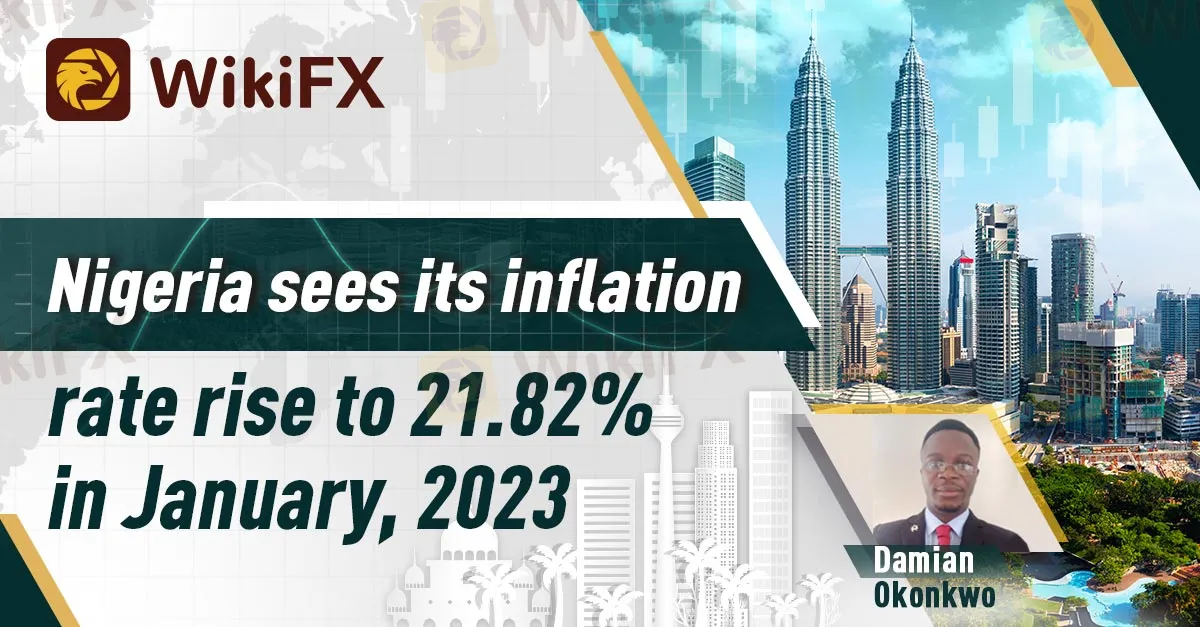简体中文
繁體中文
English
Pусский
日本語
ภาษาไทย
Tiếng Việt
Bahasa Indonesia
Español
हिन्दी
Filippiiniläinen
Français
Deutsch
Português
Türkçe
한국어
العربية
Nigeria sees its inflation rate rise to 21.82% in January, 2023
Abstract:The Nigerian inflation rate rose to 21.82% in January 2023, marking its highest level in over a decade.

By: Damian Okonkwo

Nigeria's inflation rate has surged to a new high of 21.82% in January 2023. According to the report, which was released by the National Bureau of Statistics (NBS) on Tuesday, the inflation rate in Nigeria increased by 0.99% in January 2023, compared to the 20.83% recorded in December 2022.
The current high rise in inflation is said to have been driven by the naira scarcity, which has caused prices of goods and services to skyrocket across the country.
This marks one of the highest inflation rate Nigeria has seen in over a decade, with the last time inflation was this high being in 2005 when it hit 28.2%. The latest figure shows an increase from the 20.75% recorded in December 2022.
Some economists also blamed the rise in inflation to be largely caused by the country's struggling economy and the fall in the value of the naira. Nigeria has been grappling with an economic crisis due to declining oil prices, which account for the majority of the country's revenue, and the impact of the COVID-19 pandemic.
The naira has been under pressure, with the currency losing value against the US dollar in recent months. This has led to an increase in the cost of imports, which has contributed to the rising inflation rate.
According to the NBS report, the food inflation index increased to 24.32% in January 2023 from 23.75% in December 2022. This suggests that the rising cost of food items is contributing significantly to the high inflation rate.
The report also shows that the core inflation rate, which excludes the prices of volatile agricultural produce, increased to 19.16% in January 2023 from 18.49% in December 2022.
The Nigerian government has been implementing various measures to address the country's economic challenges, including a recent decision to remove fuel subsidies and raise electricity tariffs.
However, these measures have also contributed to the rising cost of living in Nigeria, as fuel and electricity prices have increased significantly in recent months.
In response to the latest inflation figures, economists have called on the government to implement more effective policies to address the root causes of inflation, particularly naira scarcity. They have also urged the CBN to review its foreign exchange policies and take more decisive action to stabilize the currency and the economy.
Experts have further warned that the high inflation rate could have a detrimental effect on the country's economy and lead to further social unrest.
As Nigeria continues to navigate its economic challenges, it remains to be seen what measures will be taken to address the rising inflation rate and help alleviate the impact on citizens' lives.

Disclaimer:
The views in this article only represent the author's personal views, and do not constitute investment advice on this platform. This platform does not guarantee the accuracy, completeness and timeliness of the information in the article, and will not be liable for any loss caused by the use of or reliance on the information in the article.
Read more

STARTRADER Issues Alerts on Fake Sites and Unauthorized Apps
STARTRADER warns against counterfeit sites and apps using its brand name. Protect yourself by recognizing official channels to avoid fraudulent schemes.

Broker Review: Is Exnova Legit?
A forex broker named Exnova has recently come to our attention. This broker is registered in Saint Vincent and the Grenadines and started its business in 2021. In this article, we will dig into this broker deeply and provide some information if you are interested.

Capital.com Shifts to Regional Leadership as CEO Kypros Zoumidou Steps Down
Capital.com transitions to a regional leadership model as Kypros Zoumidou steps down, promoting Christoforos Soutzis as CEO of its Cyprus operations.

eToro Launches Global-Edge Smart Portfolio: A Balanced Approach to Growth and Stability
Online trading platform eToro has recently unveiled its latest investment offering—the Global-Edge Smart Portfolio. This new addition to eToro’s extensive portfolio options provides investors with a balanced approach to investing by combining global stocks and bonds, tailored for those looking for growth and stability.
WikiFX Broker
Latest News
JUST Finance and UBX Launch Multi-Currency Stablecoin Exchange
XM Revamps Website with Sleek Design and App Focus
Global Shift in Cryptocurrency Taxation: Italy and Denmark Chart New Paths
Webull Introduces 24/5 Overnight Trading to Extend U.S. Market Access
TradingView & Mexico’s Uni. Partnership, to Enhance Financial Education
Something You Need to Know About SogoTrade
eToro Launches Global-Edge Smart Portfolio: A Balanced Approach to Growth and Stability
Darwinex advises traders to update MT4 & 5
Revolut X Expands Crypto Exchange Across Europe, Targeting Pro Traders
Broker Review: Is Exnova Legit?
Currency Calculator


